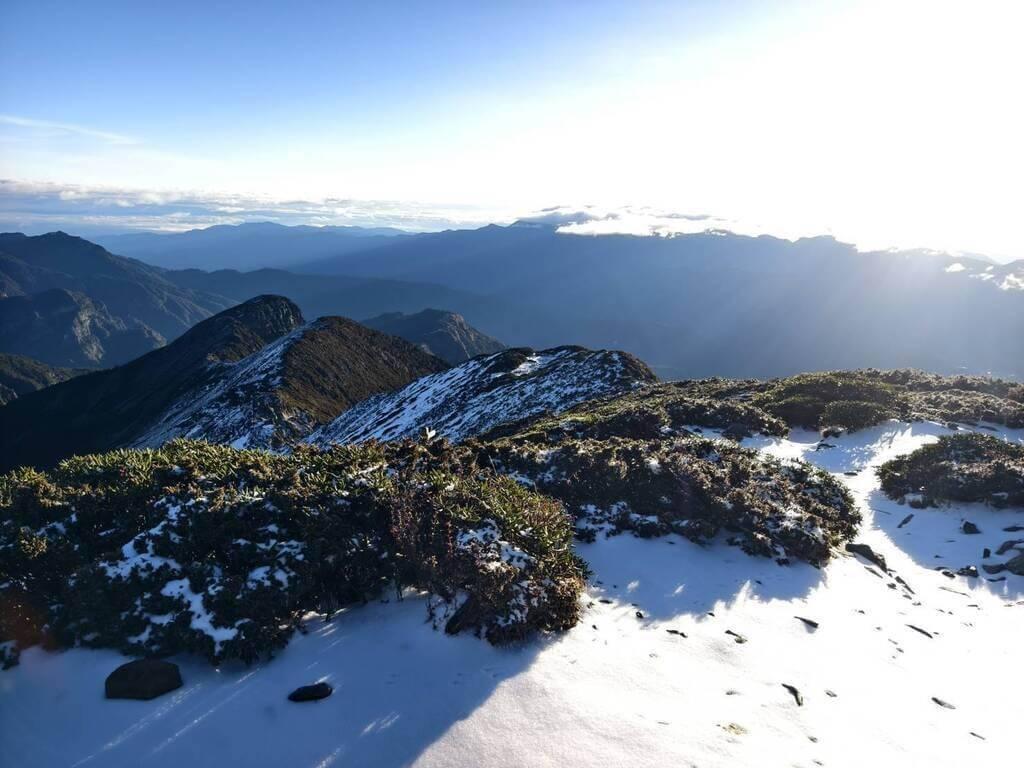The Shei-Pa National Park Headquarters today announced guidelines for hikers seeking to do one-day climbs in Hsuehshan (雪山) to avoid becoming stranded or requiring rescue resources.
A one-day round trip for Hsuehshan takes about 14 hours, covers 22km and has an elevation difference of 3,500m, the agency said, adding that it can be complicated by weather conditions or illness.
Hikers who do not reach Sanlioujiou Cabin (三六九山莊) by 11am are recommended to not continue their climb, return to the trailhead and avoid moving in the dark, it said.

Photo courtesy of Shei-Pa National Park Headquarters
This is not only for their own safety, but also to reduce the use of rescue resources, it said.
There are eight main climbing routes throughout the park, of which the main Hsuehshan route is the most popular.
Statistics from the headquarters show that 31,547 people have been approved to climb Hsuehshan in the past three years, with 3,000 one-day trips each year.
The climb requires physical fitness, the headquarters said, adding that the rapid ascent in altitude can also cause altitude sickness.
The afternoon can also bring thick fog or heavy rain, which makes following the path more difficult, it said.
Steep ascents and descents in a short period of time also use a lot of energy, leading to slower responses to emergency situations, and any delays could result in needing to descend after sunset, the headquarters said.
Management at Sanlioujiou and Cika (七卡山莊) cabins would be asked to remind hikers of the dangers associated with one-day climbs, it said.
Those who attempt one-day hikes must cooperate with inspections and listen to instructions or guidance from cabin management, the headquarters said.
Those who ignore guidance and go on to cause incidents on the mountain that affect the safety of the park or waste rescue resources would be punished according to the National Park Law (國家公園法) and local authorities would be asked to apply self-government ordinances, it added.

Eight restaurants in Taiwan yesterday secured a one-star rating from the Michelin Guide Taiwan for the first time, while three one-star restaurants from last year’s edition were promoted to two stars. Forty-three restaurants were awarded one star this year, including 34 in Taipei, five in Taichung and four in Kaohsiung. Hosu (好嶼), Chuan Ya (川雅), Sushi Kajin (鮨嘉仁), aMaze (心宴), La Vie by Thomas Buhner, Yuan Yi (元一) and Frassi in Taipei and Front House (方蒔) in Kaohsiung received a one-star rating for the first time. Hosu is known for innovative Taiwanese dishes, while Chuan Ya serves Sichuan cuisine and aMaze specializes

Taitung County is to launch charter flights to Malaysia at the end of this year, after setting up flights to Vietnam and Thailand, the Taitung County Government said yesterday. The new charter flight services, provided by low-cost carrier Batik Air Malaysia, would be part of five-day tour packages for visits to Taitung County or Malaysia. The Batik Air charter flight, with about 200 seats, would take Malaysian tourists to Taitung on Dec. 30 and then at 12:35pm return to Kuala Lumpur with Taiwanese tourists. Another charter flight would bring the Taiwanese home on Jan. 3 next year, arriving at 5:30pm, before taking the

STATS: Taiwan’s average life expectancy of 80.77 years was lower than that of Japan, Singapore and South Korea, but higher than in China, Malaysia and Indonesia Taiwan’s average life expectancy last year increased to 80.77 years, but was still not back to its pre-COVID-19 pandemic peak of 81.32 years in 2020, the Ministry of the Interior said yesterday. The average life expectancy last year increased the 0.54 years from 2023, the ministry said in a statement. For men and women, the average life expectancy last year was 77.42 years and 84.30 years respectively, up 0.48 years and 0.56 years from the previous year. Taiwan’s average life expectancy peaked at 81.32 years in 2020, as the nation was relatively unaffected by the pandemic that year. The metric

Taiwan High Speed Rail Corp. (THSRC) plans to ease strained capacity during peak hours by introducing new fare rules restricting passengers traveling without reserved seats in 2026, company Chairman Shih Che (史哲) said Wednesday. THSRC needs to tackle its capacity issue because there have been several occasions where passengers holding tickets with reserved seats did not make it onto their train in stations packed with individuals traveling without a reserved seat, Shih told reporters in a joint interview in Taipei. Non-reserved seats allow travelers maximum flexibility, but it has led to issues relating to quality of service and safety concerns, especially during